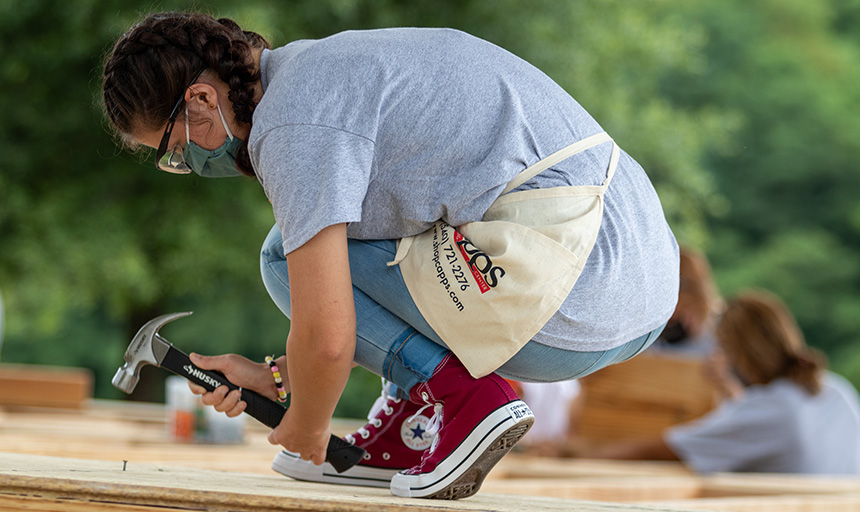New Maroons will construct the 16th R House
August 16, 2021

Roanoke College incoming freshmen and transfer students will trade their pens, pencils, laptops and tablets for hammers and nails in their first days of college life.
During orientation in August, nearly 500 new Roanoke College students will begin initial construction on this year’s “R House,” a Habitat for Humanity home for a local family in need. This marks the 16th R House that Roanoke College students have constructed for families in the Roanoke Valley.
Construction will begin on Saturday, Aug. 28, in the Hawthorn Road parking lot where students, in 90-minute shifts, will help with various tasks including framing, raising walls and hammering together roof sheathing.
The house initially will be constructed on a raised platform so the home can be moved to its permanent location after orientation. From there, Roanoke College student volunteers will continue putting the finishing touches on the house most weekends until the unveiling in December.
 A tradition since 2005, R House is more than just a construction project, according to Jesse Griffin, director of Roanoke College’s Center for Civic Engagement, who has coordinated the work each year since the project’s inception. R House is a chance for students, faculty and Habitat staff to come together for a shared goal, one that is often life-changing for families who receive the homes, said Griffin.
A tradition since 2005, R House is more than just a construction project, according to Jesse Griffin, director of Roanoke College’s Center for Civic Engagement, who has coordinated the work each year since the project’s inception. R House is a chance for students, faculty and Habitat staff to come together for a shared goal, one that is often life-changing for families who receive the homes, said Griffin.
“The project is such a great kickoff to teaching students how to share their resources and time, and that we are all part of a bigger community,” Griffin said. “This is an opportunity for students to recognize and normalize how important stability is in peoples’ lives.”
Jesse Griffin
The R House build creates a rare moment of shared experience that helps weave an individual’s Roanoke College experience within the context of the whole community, regardless of a student’s major ...
~ Brian Clark '01, construction director for Habitat for Humanity in the Roanoke Valley
The recipient family of this year’s R House is a single mother with three sons ranging from age five months to 14 years. The house — a two-story, 1,200-square-foot structure at 1002 Fairfax Ave. in the Melrose-Orange Avenue corridor — is the eighth and final home Roanoke College students will complete in the area, as Habitat’s plans for work will move to the Belmont-Fallon area in 2022. The house will include three bedrooms and two bathrooms with a spacious, open first-floor plan.
While funding for Habitat for Humanity houses largely comes from the U.S. Department of Housing and Urban Development, grants and individual donors, projects such as R House could not exist without the help from student volunteers, a service Griffin hopes students carry with them beyond the length of the house-building project.
“Habitat does make change in direct and indirect ways,” Griffin said. “Involving students in that change is an incredible teaching tool and also a way to create a community connection.”
Because of the foundation of service that R House provides, many Roanoke College alumni have pursued careers with Habitat for Humanity, Griffin said. Brian Clark '01 has worked for Habitat for Humanity in the Roanoke Valley since 2006 and is the current construction director for R House and other Habitat projects. Clark said R House offers a unique opportunity for students to bond with peers from day one while also contributing to the community.
 “The R House build creates a rare moment of shared experience that helps weave an individual’s Roanoke College experience within the context of the whole community, regardless of a student’s major or athletic participation or other activities,” Clark said. “I definitely think that the experience of participating in a service project of that magnitude, immediately upon arrival to campus, helps students consider and prioritize their own community involvement very early in the college process.”
“The R House build creates a rare moment of shared experience that helps weave an individual’s Roanoke College experience within the context of the whole community, regardless of a student’s major or athletic participation or other activities,” Clark said. “I definitely think that the experience of participating in a service project of that magnitude, immediately upon arrival to campus, helps students consider and prioritize their own community involvement very early in the college process.”
Beyond building a house, Clark said he hopes students take the time to reflect on their R House experience and transfer the skills gained from the build to the classroom.
Brian Clark ‘01
R House “is way outside of their comfort zone,” Clark said. “I hope these students gain confidence through the experience to try new things and maintain their tenacity when their studies are tough, or life in general gets challenging.”
Most importantly, R House positively changes the future for families in need, and it is their hope that students remember the family they help, both Griffin and Clark said.
“In a general sense, I hope that students recognize that giving and participating in service to others can be fun and exciting,” said Clark. “For all, I hope they recognize that many of us may need help from others in our lives, of varying degrees. Paying it forward, while we are able, has positive impacts on individuals and the whole community.”